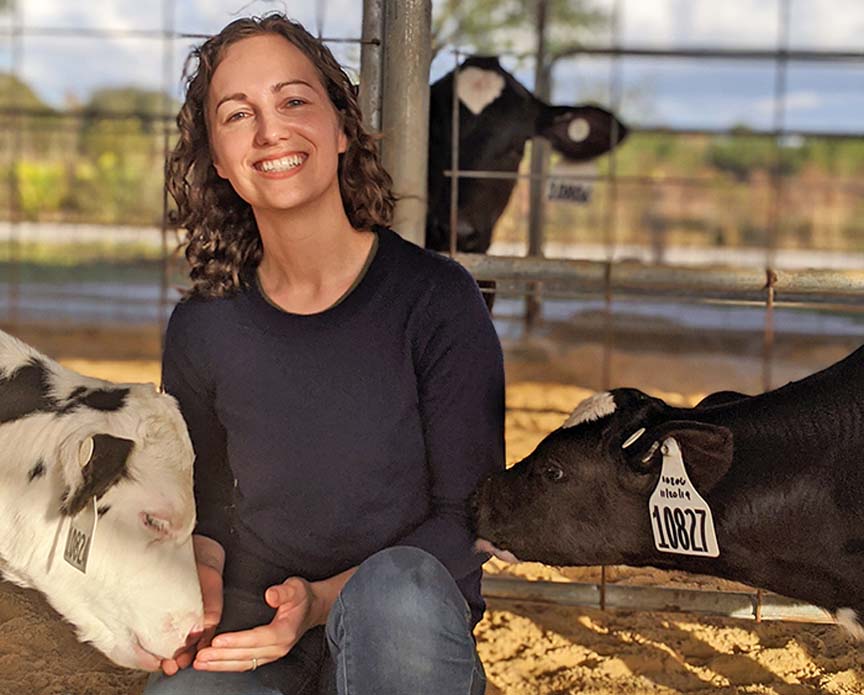Understanding Animal Welfare Through Behavior by Dr. Emily Miller-Cushon
Understanding Animal Welfare Through Behavior
by Dr. Emily Miller-Cushon
Animal welfare within the food and agriculture industries has become increasingly important to consumers. For animal researchers like Emily Miller-Cushon, Assistant Professor of Animal Behavior in the UF/IFAS Department of Animal Sciences, studying animal welfare has been her life's work.
"Understanding and improving animal welfare is critical for the sustainability of animal agriculture," said Miller-Cushon. "Animal welfare, which refers to how an animal is feeling, is of growing concern to the public, and the majority consider science-based recommendations to be the best course of action towards improving animal care."
 Emily Miller-Cushon, PhD, is on the teaching and research staff in the Department of Animal Science at the University of Florida.
Emily Miller-Cushon, PhD, is on the teaching and research staff in the Department of Animal Science at the University of Florida.Dr. Miller-Cushon's goal is to develop those science-based recommendations through her research. She works to understand how early life experiences affect behavioral development and impact the long-term welfare of animals. The research findings are meant to be applied to working animal operations to improve animal welfare on-farm. Measuring the psychological state of an animal can be complex. Miller-Cushon approaches this task by focusing her research on targeted animal behavior.
Measuring animal behavior is a method of gaining insight into how animals are feeling. By measuring behavior, researchers have a baseline to improve practices for raising and managing livestock. Miller-Cushon's team studies how young dairy calves develop social behaviors, and how early social contact may have important consequences for long-term ability to cope with stressful events. Most livestock species are social and prefer to feed and rest with other animals. Changes in social behavior can also reveal problems like sickness or pain. Behaviors indicate how an animal is feeling - even though they can't always tell us.
While public concern does drive efforts to improve animal welfare, there are also positive economic implications for producers. Stress negatively impacts animal growth and production. Improved welfare allows animals to develop more of the skills required to be adaptable. Therefore, these animals are less stressed by changes in the environment. Miller-Cushon hopes to not only improve the life experiences of the animals but by doing so, improve animal productivity.
"Animal welfare is a growing priority in all of animal agriculture," Said Miller-Cushon. "This ongoing research is aimed at developing recommendations to improve aspects of animal care from birth."
Miller-Cushon conducts her research with dairy calves raised at the UF Dairy Unit. Her team examines how different management factors, such as changes in early social environments affect measures of behavior. Animal sciences graduate student, Katie Gingerich, has conducted research under Miller-Cushon assessing changes in social behavior as an indicator of pain in calves. Graduate students Emily Lindner and Jess Bonney are beginning a project assessing how early social contact for dairy calves affects long-term behavior and production outcomes. They measure animal behavior using live observation, automated monitoring technologies, and video recordings. These observations help characterize feeding behavior, social interactions between calves, rest and activity, and other behaviors like grooming. By following these animals longer-term, they can see how different aspects of early life management affect calf behavior, response to different life events like movement to a new social group, health, and growth.
Upcoming Events
Crops, Cows & Critters - Southwest New York Dairy, Livestock & Field Crops Newsletter Sponsorship
December 19, 2025
Our two forms of publications feature research-based and timely information from our four specialists, listed to the right, along with local event notifications and Cornell University outreach. This information is provided to participants who range from dairy, livestock, and field crops producers to agricultural suppliers and consultants.
Weekly Email Update: Shared with 625+ households who have signed up with our program.
Monthly Paper Mailer: To reach our stakeholders and farmers who lack internet access, we send out a monthly mailer where your company's logo and contact information would be featured with a mailing list of 330+ households.
If you sponsor our weekly and monthly publications you reach approximately 955 households.
Visit our website to view our newsletters!
2025 Cornell Food Beverage & Animal Feed Manufacturer Survey
December 19, 2025
Industry and Educational Advocates for New York State's Food, Beverage, and Animal Feed Manufacturing industries:
As you know, NYS has a diverse food and beverage manufacturing industry, in both the types of industries that exist and the wide distribution of firms by scale. Many manufacturing firms have strong backward linkages to agricultural production sectors in the state that support both farm-level and downstream food industry firms and consumers. In collaboration with the New York State Department of Agriculture and Markets, a team from Cornell University's Charles H. Dyson School of Applied Economics and Management has recently rolled out the 2025 New York State Food, Beverage, and Animal Feed Manufacturer Survey. The industry will benefit from an updated assessment of the industry that informs private and public investments and opportunities to support firm growth and improved profitability.
Boots in the Barn: Cornell Dairy Research Updates
January 13, 2026
January 20, 2026
January 27, 2026
February 3, 2026
February 10, 2026
February 17, 2026
February 24, 2026
Join us for some or all!
Announcements
No announcements at this time.





